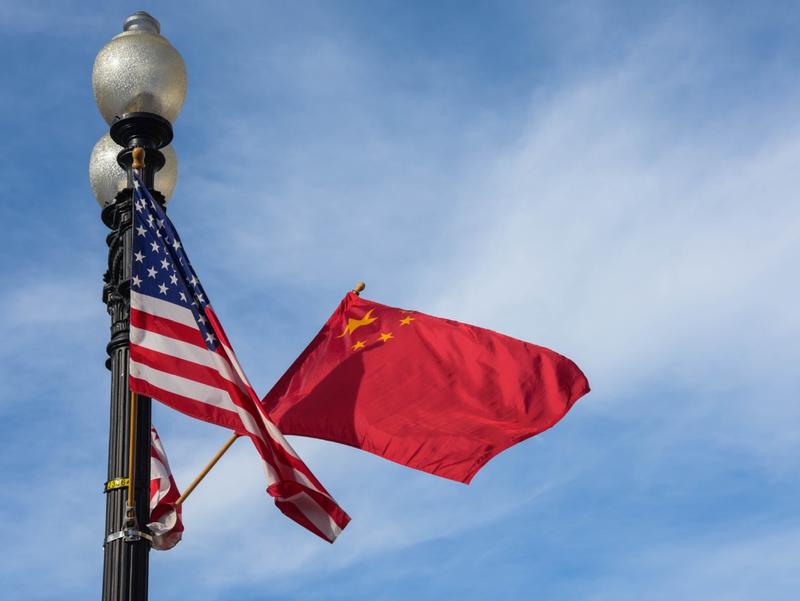 This Sept 24, 2015 file photo shows the national flags of China and the United States. (PHOTO / XINHUA)
This Sept 24, 2015 file photo shows the national flags of China and the United States. (PHOTO / XINHUA)
During the height of the COVID-19 pandemic, two packs of face masks were shipped separately from China to Kenneth Quinn, retired president of the World Food Prize Foundation and a former US diplomat. The gifts made him more determined than ever to play a role in maintaining the friendship between China and the United States.
"One (pack) was from Professor Yuan Longping-I once presented him with an award called the World Food Prize in (the US state of ) Iowa," Quinn said. "The other one was from my friends in Hebei province, because I've been there several times and have a wonderful relationship with local people."
I don't believe America could do it alone. I don't believe China could do it alone. But I do truly believe if China and America - and maybe some others as well -can work together, we could ensure there is no hunger and poverty in the world.
Kenneth Quinn, former president, World Food Prize Foundation
Quinn, who had served as US ambassador to Cambodia, shared the masks with the doctors and nurses in hospitals in Iowa, where he lives, "as a way of promoting ongoing friendship between our two countries". He said he is "very touched by that friendship".
"It will make the world perfect with collaboration and coordination between China and the US," he said. "We can't have conflicts. We have to be able to work together."
According to a United Nations report, the world's population is expected to increase to 9.7 billion in 2050, and Quinn believes that no single country will manage to feed everyone.
"I don't believe America could do it alone. I don't believe China could do it alone," he said."But I do truly believe if China and America-and maybe some others as well-can work together, we could ensure there is no hunger and poverty in the world."
The two countries, which have great capabilities, should partner to help all parts of the world eliminate hunger and lift people out of poverty, he added.
"What I hope is that we can shake off whatever problems or difficulties there are at the government level, and always rely on the people-to-people friendship and continue to build a partnership between our two great countries," Quinn said.
History has shown that when China and the US cooperate, they can always overcome difficulties, such as the hard times seen during World War II when the two countries were attacked, the former diplomat said.
"No matter how difficult things are right now-where there are harsh words being said and actions being taken-we should pause to remember that when we both could have lost our independence, we were together struggling. And neither one of us was conquered at last," he said.
Quinn said both sides should find ways to put differences aside and solve problems, and suggested that the process of seeking dispute resolution should be "quiet and peaceful", without "shouting at the top of our voice".
READ MORE: Foreign Ministry seeks improved Sino-US ties
Diplomatic career
During his diplomatic career, Quinn, who made his first trip to China in 1979 and has since returned frequently, has witnessed the ever-evolving Sino-US friendship. He said he felt "very fortunate to have so many interactions" with China.
Quinn recalled the time in 1985 when he got to escort Xi Jinping, then Party secretary of Zhengding county in Hebei province, who led a small delegation from Hebei province on a two-week visit to learn about US agriculture, to the World Food Prize Hall of Laureates in Des Moines, Iowa, for the signing of an agricultural agreement.
"He came here as a very young man in 1985. It was one of his first visits outside China, also in the early stage of the relationship between the US and China. When he came here, he was very warmly received by local people."
In 2012, then vice-president Xi went back to the Midwestern state and also paid a visit to Eleanor and Thomas Dvorchak, a couple that hosted him almost 30 years earlier.
ALSO READ: New Sino-US ties ‘key to global interests’
In the backyard of the building where Quinn worked, there stands a Chinese-style garden pavilion, a symbol of the friendship between Hebei and Iowa, as well as between China and the US.
"In May 2018, we were having an event in the garden when suddenly it started to blow and rain, and a tornado was coming. I was so afraid that the tornado might hit the beautiful garden building," he said.
"But when the terrible dark cloud went away. It was still there, still beautiful. And this period (between China and the US) is like that.
"The clouds will pass, the sun will come back out, and our friendship between the two countries, between our peoples, will still be there."


